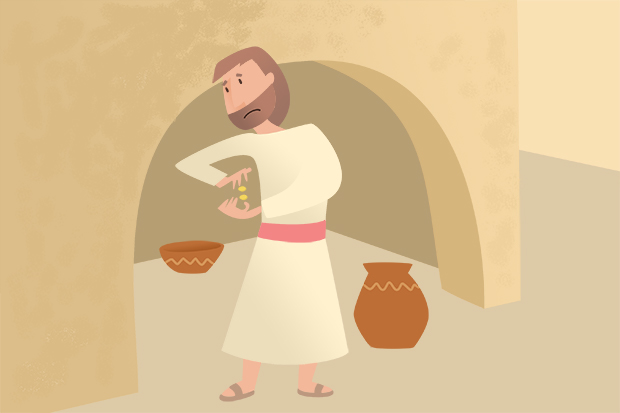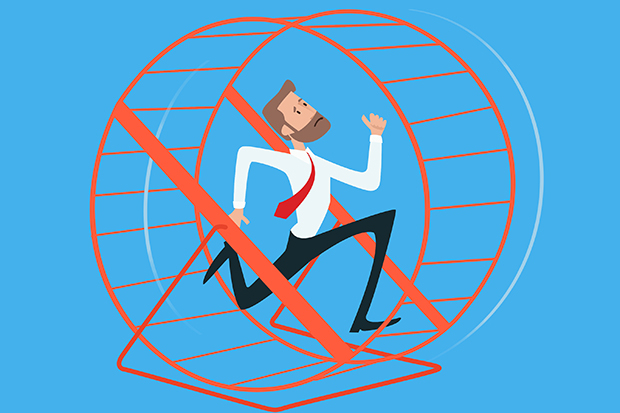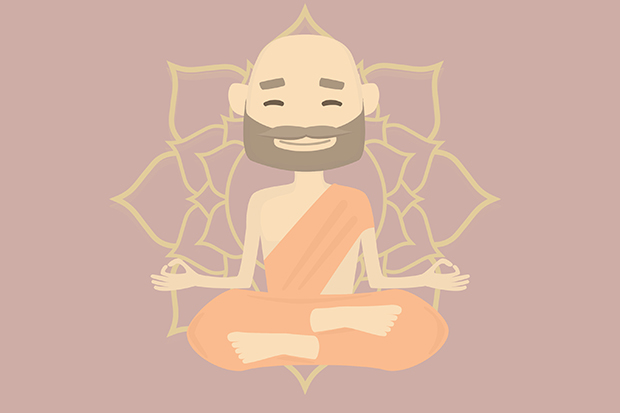on

Two thousand years ago, an itinerant preacher went around seeking to spread this message that the kingdom of God was at hand. This message formed the core of his teaching. Through his actions, he hoped to lead the haggard, despondent populace to this comforting truth, away from the self-perpetuating pain and misery that life on this planet had become. He wanted people to taste this heaven right here on earth. His message, however, did not catch on. This preacher’s name was Jesus Christ. Two thousand years hence, we are no closer to having understood Christ’s message. The people are just as distressed and helpless as ever. The pain and misery continue. In fact, it has grown manifold.
The trouble largely resulted from the interpretations that were given to Christ’s teachings—the result of a climate of messianic expectation into which Christ was born. This climate prevailed much through Christ’s ministry. Christ’s teachings, as a result, were made to fit a narrative that ultimately undermined their usefulness. Their meanings were so altered over the years that people would now baulk at the suggestion that these teachings had originally been intended to serve a different purpose. They were meant to bring consciousness into our lives and thus help us reach that kingdom of God that Christ promised was here.
Let us now look at the most important of the parables that Christ taught, one that, when understood in its proper context, helps us make sense of nearly all of Christ’s other teachings. For those not familiar with the parable of the Prodigal Son from Luke 15, here is a summary:
A father had two sons, the youngest of whom asks for his share of his father’s wealth. The father grants him his portion. The son then travels to a foreign country where he proceeds to squander his inheritance in extravagant living. Soon, he loses all his wealth. Now destitute, he is forced to work as a swineherd and finally comes to his senses. He goes home intending to beg his father to accept him back, even only as a servant. Upon his return, however, he finds his father overjoyed. His father calls for the servants to fetch his son a fine robe, a ring, and sandals and orders the slaughter of the ‘fatted calf’ to celebrate his son’s return. The older son, who was away in the fields, returns home to the sound of celebration and learns that his younger brother is back. Enraged, he refuses to partake in the festivities. The father then explains that because the younger son had returned seemingly from the dead, celebration was necessary.
Let us now look at the context in which this parable appears. At the start of chapter 15 of Luke, we see the Pharisees and the scribes condemn Jesus for keeping company with the tax collectors and sinners, who they consider to be godless. All three parables—the other two being the parable of the Lost Sheep and the Lost Coin—are offered in reply to this accusation and seem to answer the Jewish authorities, typified by the older brother of the parable, on why Christ sought out the sinners. The younger son represents the sinners, and the elder brother symbolises the self-righteous. Traditional interpretations of this parable revolve around God’s loving attitude towards the lost and the restoration of their fellowship with Him. But is that all what the parable was meant to convey? The context provided precludes any other possibility. In a sense, this is the fate that befell many of Christ’s teachings.
There is yet another layer to this parable worth bringing to the surface. We associate the younger son with the tax collectors and sinners and, as a result, refuse to identify with him. Thus, we reject its lesson. This parable essentially is about the nature of our existence on this earthly plane. The father in this parable is consciousness. The far country that the son travelled to is this world. The wealth that the son brought here is his share of consciousness. This world has no wealth of its own; it has no supply of consciousness. What translates into the world’s wealth, then, is our consciousness. What does money represent? It is just human consciousness ensnared in needs, wants, and desires. What use would money be to you if you possessed none of these?
Our predicament is no different than that of the prodigal son. We are caught here, unable to free ourselves. Our consciousness is not ours at all; in this world it is found tied to needs and desires, bound to things of the world. This is what is meant by the son wasting his wealth in ‘riotous living’. What frees the son, then? The son becomes poor before he remembers his father and journeys home. We are essentially the flow of consciousness. We are its expression. But we would remain here until we see our true nature. To become poor is to awaken to this reality that one isn’t the source of one’s wealth. The way that leads homeward has to be travelled empty-handed. The belief that you have an existence of your own, that your consciousness is your own, is what keeps you trapped here. Once you see into your nature, you would draw closer to the source of consciousness, this source which Christ addresses as Father. The journey home is one that plays out in our understanding. The older brother who never leaves his father represents those who are not aware of their distance from the Father and who thus cannot make this journey home.
When Christ says in Matthew 5:3, ‘Blessed are the poor in spirit, for theirs is the kingdom of heaven’, he means that those who understand that they have no real existence apart from consciousness are closer to breaking free. From Mark 10:25, ‘It is easier for a camel to go through a needle’s eye than for a rich man to enter into God’s kingdom’ reminds us that those counting on their own stratagems are not aware of how misguided they are. This richness is our idea that we own all that we own; this richness that gets in our way feeds the countless things that drain our consciousness. Let me now briefly touch upon another parable from Luke 12:
He spoke a parable to them, saying, ‘The ground of a certain rich man produced abundantly. He reasoned within himself, saying, “What will I do, because I don’t have room to store my crops?” He said, “This is what I will do. I will pull down my barns, build bigger ones, and there I will store all my grain and my goods. I will tell my soul, ‘Soul, you have many goods laid up for many years. Take your ease, eat, drink, and be merry.’ ”
‘But God said to him, “You foolish one, tonight your soul is required of you. The things which you have prepared—whose will they be?” So is he who lays up treasure for himself, and is not rich toward God.’
What is life but consciousness? What is that which guarantees access to all that you value and cherish? Is it not consciousness? Seek, then, to increase that. The kindness and good deeds that Christ asked you to practise are asked of you so that you grow in consciousness. This very consciousness that flows into you now is your Father; this is your kingdom of heaven. All that this Father wants of you is that you use your consciousness wisely. Be wary of anyone who says otherwise. The heaven that you get to after you are dead and gone—what use is it to you here?
Know this: If there is pain and suffering in our lives, it is because our consciousness is flowing where it should not. If we are feeling helpless, it is because we are being drained of our consciousness. The solution is to seek more of consciousness, not to pretend that some all-powerful God is going to make our problems disappear. Once we know the source of consciousness, we will realise that we have access to an endless amount of it. Having known our nature, however, we must not withdraw from life, because this is where we must explore its possibilities. This is where we can put it to use, where we can learn its myriad ways.
Where did the Christians falter? They were misled by a vocal few who hijacked Christ’s message and altered it so as to preserve their old beliefs. Though the dominant flavour has been changed, someone willing to read between the lines can still see the truth. They forgot to alter what Christ had shown by example. Christ, when he felt the need to speak to his Father, sought out mountains and wilderness, not synagogues. Alone, away from other people, we have no need to sustain the ‘self’ which is a structure we have created to deal with the world. Our consciousness is not taken up by the self. Alone, we are closer to what we truly are. We become poor, empty.
And Christ spoke to us of a Father, not a God. Just ask yourselves: What would a father want of his children? People worshipped gods before Christ. They assumed Christ’s Father was the same as their gods, but Christ had warned them of mixing his teachings with their old notions. In Matthew 9:16-17, we read, ‘No one puts a piece of unshrunk cloth on an old garment; for the patch would tear away from the garment, and a worse hole is made. Neither do people put new wine into old wine skins, or else the skins would burst, and the wine be spilled, and the skins ruined. No, they put new wine into fresh wine skins, and both are preserved’.
Just think about it. If Christians the world over had truly understood what Christ taught, imagine what sort of a world we might have had. Think what these words from Matthew 5:14-15 mean: ‘You are the light of the world. A city located on a hill can’t be hidden. Neither do you light a lamp and put it under a measuring basket, but on a stand; and it shines to all who are in the house’. Do these words suggest that we await saviours? Do they imply that we are at the mercy of a capricious God? The roots of the kingdom of God lie in us. Consciousness is everywhere. Even the vilest sinner has consciousness flowing into him. Consciousness is what we all begin as—untainted by hatred, desire, or worldly concerns. Know that around every conscious man or woman, there is a small heaven.
All around us, a darkness continues to spread. It grows because we remain ignorant of the light within. The unconsciousness that should have vanished from human lives long ago rages on unabated. It is time we woke up. It is time we acknowledged that worshipping a God who lives in some distant sky is not doing us any good. It is time we asked ourselves what it was that Christ really wanted us to have—a Christ who gave his life so that we could have it in abundance. Use your consciousness wisely. What has the pandemic taught you? What came to your aid? Learn to value the consciousness in you and those around you. Try and preserve that. This consciousness is your way home, the peace Christ invited you to.




